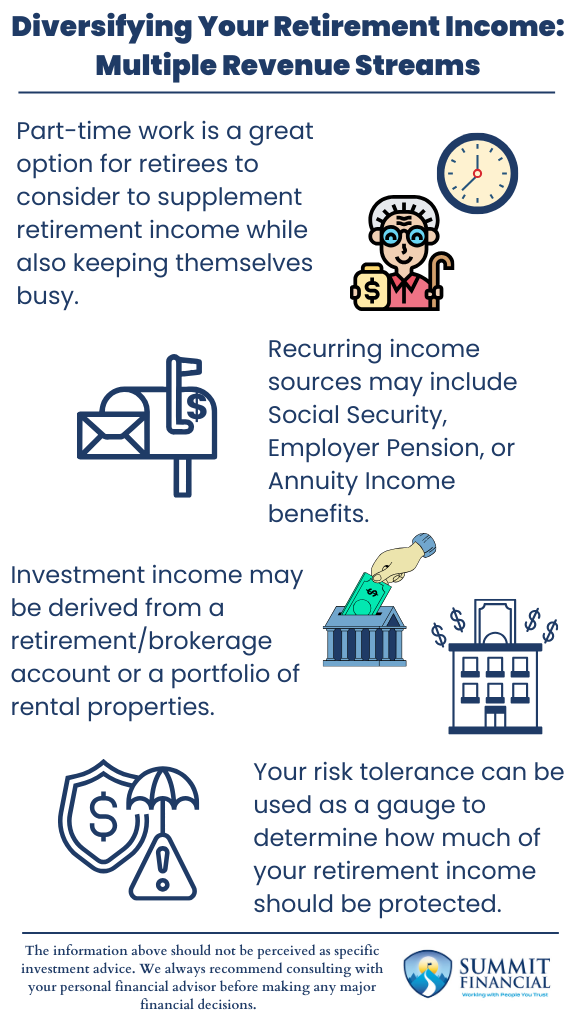Planning for your future retirement income needs may be one of the toughest financial tasks you will face. There is a lot of uncertainty around the future of the economy as well as your potential life expectancy.
There are some factors that are out of your control, such as the market performance, inflation impacts, and even tax rates.
However, you can control your monthly budget and how much you save in preparation for retirement. This blog post will detail the most common sources of retirement income that we see with our clients.
Part-Time Work in Retirement: Not Just About the Money
First, I wanted to address the fact that we see a decent amount of our retired clients pursue some sort of part-time employment. This is a great way to supplement your other retirement income sources and will certainly help improve your financial plan.
However, our clients tend to work part-time simply to keep themselves busy, or they consider it a hobby.
Going from (or transitioning from) working 40+ hours your entire life to working 0 hours a week can be a drastic change, and many individuals or couples struggle with the extra time in their day.
Part-time work can be a great way for retirees to:
-
Stay active
-
Remain social
-
Increase retirement income
Reliable Monthly Payments: Social Security, Pensions, and Annuities
Perhaps the most beneficial source of income to have is a recurring benefit payment. This could be your Social Security benefits, which may vary depending on the specific age you activate the benefits, or you could be provided a pension income benefit throughout retirement from a previous employer.
Pensions are becoming increasingly rare, so we have clients who are choosing to fund their own “pension” benefits with an annuity policy with income riders. You can read more about these in our previous blog post on Annuity Income in Retirement.
All these income sources are backed by the U.S. government or a financial/insurance institution. This means that you can potentially receive a lifetime income stream throughout retirement to help pay for your monthly expenses.

Investment-Based Income: Withdrawals, Dividends, and Real Estate
The next most common source of retirement income comes from investments made during the working years. This is usually in the form of retirement or brokerage account withdrawals or payouts of dividends from the underlying positions. You have invested these savings over the years, and they have grown into a comfortable nest egg.
When expenses exceed the income sources detailed above, additional withdrawals can be used to cover the remainder. Of course, it is important to limit withdrawals to avoid outliving these savings. Another type of investment income could come in the form of rental properties.
Instead of investing in the market, some clients choose to invest in real estate, which provides an income stream with the potential to sell the property for a lump sum.
The income and property value may fluctuate due to changes in the economy, so it may not be as stable as the items we mentioned above. These fluctuations tend to make real estate income less predictable and an overall riskier strategy than other streams of income.
Balancing Income Strategy with Your Risk Tolerance
It is important to note that your risk tolerance will play a big part in determining which route you should focus on. Those who are more conservative in their investments would appreciate the peace of mind associated with the recurring income options.
This means that our risk-averse clients tend to gravitate towards exploring the pension option from their employer if they are offered a lump sum alternative, or they might decide to fund an income annuity rather than keep the savings invested in the market.
More risk-tolerant clients would prefer to invest their savings and potentially grow their assets while making withdrawals for income needs. Risk-tolerant clients might see more fluctuations in their account balances, and they may face losses if the market experiences a severe downturn, which may cause a need for a reduction in spending to offset the lower account values.
Diversify Your Retirement Income – Highlights
- Part-time work is a great option for retirees to consider to supplement retirement income while also keeping themselves busy.
- Recurring income sources may include Social Security, Employer Pension, or Annuity Income benefits.
- Investment income may be derived from a retirement/brokerage account or a portfolio of rental properties.
- Your risk tolerance can be used as a gauge to determine how much of your retirement income should be protected.
Speak With a Trusted Advisor
If you have any questions about your investment portfolio, retirement planning, tax strategies, our 401(k) recommendation service, or other general questions, please give our office a call at (586) 226-2100. Please feel free to forward this commentary to a friend, family member, or co-worker. If you have had any changes to your income, job, family, health insurance, risk tolerance, or your overall financial situation, please give us a call so we can discuss it.
We hope you learned something today. If you have any feedback or suggestions, we would love to hear them.
Best Regards,
Zachary A. Bachner, CFP®
with contributions from Robert Wink, Kenneth Wink, and James Wink.
If you found this article helpful, consider reading:
- How Do Bull Markets and Bear Markets Differ
- Navigating College Funding
- Financial Planning Mistakes to Avoid
- Tax Filing Explained
Sources:


